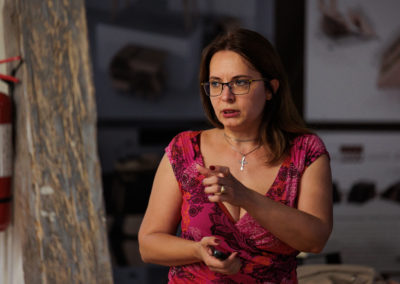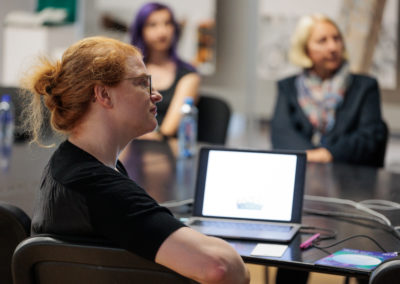
Public lectures by Meda Andrei
𝐌𝐞𝐝𝐚 𝐃𝐚𝐧𝐢𝐞𝐥𝐚 𝐀𝐧𝐝𝐫𝐞𝐢 is a meteorologist with a remarkable career in both meteorology and physical sciences. She has 23 years of experience in the field studying the development of complex meteorological phenomena which affect everyday life, working mostly at the National Meteorological Administration in Bucharest. She received her PhD in physics on “Research on the dynamical and thermodynamic processes that determine the occurrence of severe weather phenomena”, raising awareness of the powerful effects of weather phenomena. In her view, climate change is an “invisible enemy of our time”, which demands from us more actions and engagement to deal with the consequences.
Listening to Weather and Landscape
27 September 2023 l Talk l Universitatea de Vest Timișoara, Faculty of Fine Arts and Design
4 Oituz Street
Asociatia Galeria Noua in partnership with Asociatia Romana de Arta Contemporana and Universitatea de Vest Timisoara are pleased to invite you to a public lecture by meteorologist Meda Andrei. Their lecture will provide an insight into their respective research, offering an extension to the theme of the exhibition project “Blue Sun. Conversations about art, science and ecology”.

About Meda Andrei’s public lecture
Severe and extreme weather events, which are increasing in frequency and intensity through: melting glaciers, increasingly warm winters, hot summers, longer droughts and hard-to-control forest fires, are the undeniable result of climate change. Climate change, our ‘invisible enemy’ until now, is becoming more visible and directly affecting our lives.
Among the causes contributing to climate change are: burning fossil fuels, agriculture, transport and deforestation. The massive consequences of these activities are being felt in the atmosphere through the ‘greenhouse effect’, which has been present since the industrial age (last 150 years), with temperatures rising faster than at any other time, with estimates of +4°C higher. In the last 10,000 years there has been a temperature rise of 5°C, which today can happen in just a few tens or hundreds of years. At the same time, an extreme temperature phenomenon that in pre-industrial times was observed once every 10 years is now observed about 3 times every 10 years (extreme precipitation – the amount of water has increased by 6.7%). Compared to the Romanian area, hailfalls are increasing. These are just a few of the phenomena that have changed in recent decades and that affect us directly.
In this respect, climate drivers contributing to these phenomena include: fossil fuel burning, agriculture, transport and deforestation. The massive consequences of these activities are felt in the atmosphere through the ‘greenhouse effect’, which has been present since the industrial age (the last 150 years), with temperatures rising faster than at any other time, with estimates of +4°C higher. In the last 10,000 years there has been a temperature rise of 5°C, which today can happen in just a few tens or hundreds of years. At the same time, an extreme temperature phenomenon that in pre-industrial times was observed once every 10 years is now observed about 3 times every 10 years (extreme precipitation – the amount of water has increased by 6.7%). Compared to the Romanian area, hailfalls are increasing. These are just a few of the phenomena that have changed in recent decades and that affect us directly. According to the World Meteorological Organization (WMO), the level of carbon dioxide (CO2) in the atmosphere continues to rise alarmingly, with a record high in 2019 of almost 150% higher than in 1750. Climate change poses a threat to food security, health and availability and may lead to more people having to flee affected areas, thus generating an increase in the number of climate refugees.
It is essential that people are aware of the seriousness of the impact of rising global average temperatures and take action to reduce the effects of climate change and help us adapt to it.
The ”Blue Sun” project is included in the extended programme of Timisoara 2023 – European Capital of Culture.
The project “Blue Sun – Conversation on art, science, and ecology” benefits from a 93960 Euro grant from Iceland, Liechtenstein and Norway through the EEA and Norway Grants.
The EEA and Norway Grants represent the contribution of Iceland, Liechtenstein and Norway towards a green, competitive and inclusive Europe. There are two overall objectives: reduction of economic and social disparities in Europe, and to
strengthen bilateral relations between the donor countries and 15 EU countries in Central and Southern Europe and the Baltics. The three donor countries cooperate closely with the EU through the Agreement on the European Economic Area (EEA). The donors have provided €3.3 billion through consecutive grant schemes between 1994 and 2014. For the period 2014-2021, the EEA and Norway Grants amount to €2.8 billion. More details are available on: www.eeagrants.org and www.eeagrants.ro








